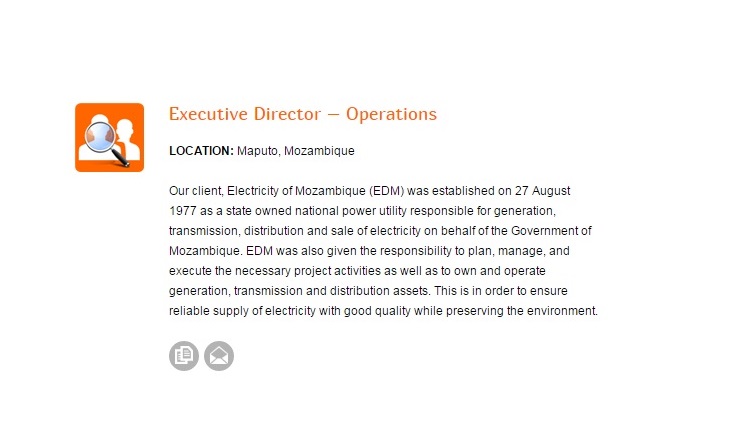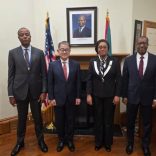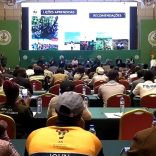Mozambique: Japan is crucial partner for structural projects – Finance Minister
Hanlon: Pedro Couto opts for international recruitment, as the question is asked: Do unqualified managers & ghost workers explain power cuts, air ban?

Into Africa Recruitment (pic)
Some of Mozambique’s state companies were well run and profitable, but in the past decade many have become sloppy and inefficient, if not corrupt. Power cuts in Beira and Maputo reflected a decade of deferred maintenance and slow responses to problems at Electricidade de Mocambique (EdM). MCel, the first mobile phone company and long the leader, has slipped into third place. Tickets on the airline LAM are expensive and the company is inefficient. Land line telephone company TDM is hugely in debt because it has allowed both private and public customers to not pay their bills, according to Transport and Communications Vice-Minister Manuela Ribeiro. It seems as if jobs are increasingly filled by friends and relatives who feel no responsibility to do more than the minimum, while management is lax. This leads to increasing pressure to privatise the remaining state companies and end an important area of Frelimo patronage. But change is happening in some areas.
The respected Energy Minister Pedro Couto on 24 June dismissed four senior executives and board members of EdM, leaving in place only the CEO Mateus Magala. Three of the executives had only been appointed in September 2014 under the former Guebuza government. On 8 July EdM launched an unprecedented (for Mozambique) international recruitment campaign to fill the posts. Preference will be given to Mozambicans and the four, and other EDM staff, can apply for the reconfigured jobs. The recruitment process is being run by South African recruiter Eileen Drysdale of Into Africa Recruitment. EdM has also published its first code of ethics. (Zitamar 29 June, 8 July) Marcelo Mosse writes in his newsletter (5 July) the the state holding company IGEPE wants to introduce a more disciplined selection process for administrators, similar to what Couto has done, but this is being resisted by the Council of Ministers who do not want to lose their patronage powers.
More than 26,000 civil servants have not given proof of their existence and have had their salaries stopped, it was announced on 5 July. There was a campaign between July and December last year to take biometric data from all civil servants, and over 309,000 employees had their fingerprints taken. O Pais (11 July) notes that most of those who failed to prove they existed are in cities, including 6,500 in Maputo and Matola, where the publicity campaign was greatest. This suggests they are “ghost workers”, with officials pocketing salaries of non-existent staff. In the Ministry of Education and the army, nearly $2 mn was siphoned off in this way.
The first coherent explanation of why the EU has banned flights by Mozambican airlines has been given by Alves Gomes, a pilot and vice president for transport of CTA, the confederation of economic associations. For more than two decades Mozambique has been ignoring the “recommendations” (which are in fact obligatory) of the International Civil Aviation Organization (ICAO) relating to the national airline LAM, Mozambique’s airports, and the local civil aviation regulator. He explains that in 2010 LAM signed a contract with Air Seychelles, a subsidiary of Air France, to fly to Europe. Air Seychelles demanded upgrading of the airports, so LAM cancelled the contract, so parent Air France released the list of problems, and Mozambique was put on the EU blacklist. Gomes says, simply, “we’ll never get off the black list” because the Civil Aviation Institute has many so many workers who are “not qualified” for their job, and because LAM, “now has a Board of Directors without anyone who understands aviation.” (@Verdade 1 July).
By: Joseph Hanlon













Leave a Reply
Be the First to Comment!
You must be logged in to post a comment.
You must be logged in to post a comment.